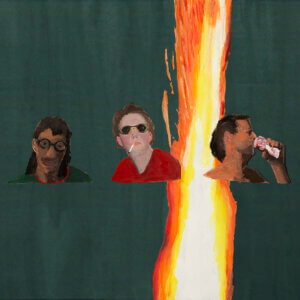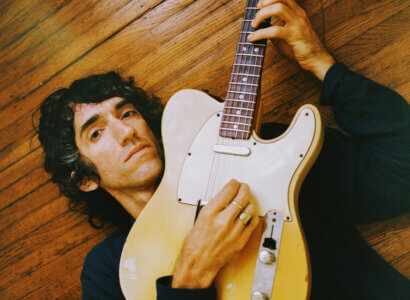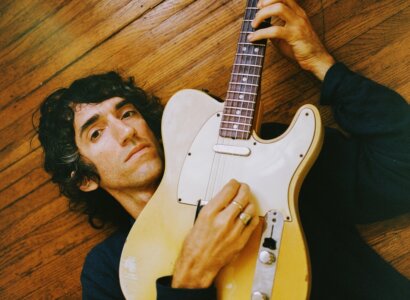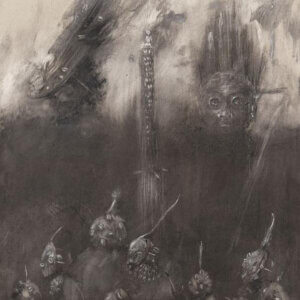Delicate Steve’s Not So Delicate Work Ethic

Part of the industry since high school, Steve Marion, better known by stage name Delicate Steve, is confident to stand alone. Focusing in on himself for his third LP This Is Steve he managed to create something truly him, putting the record together all on his own, in just 11 days. A master collaborator who’s worked with everyone from Paul Simon to even members of Death Grips, nothing is off limits. Catching him before his set at RBC Ottawa Bluesfest, we talked to Marion about staying solo, starting young and why sometimes you have to abandon cool ideas
Northern Transmissions:In a world where basically everyone sings on their record, why do you think your vocal-less music has caught on so well?
Steve Marion: I think it’s as driven as vocal-pop, that’s one of the keys. It’s striving to be pop, not to experimental from my perspective. It allows itself to resonate with more people in that way.
NT: You’ve collaborated with people from all over the spectrum so I was curious if you take a different approach than on your own records?
SM: Now just because I’m so busy, all the stuff I do is pretty first instinct. That’s how I approach writing for delicate Steve as well, following my first instinct until I make a song. With the collaborations it’s pretty similar. Just getting more of the subconscious rather than seeking perfection.
NT: I know you also worked with Zach Hill from Death Grips, how did that come about and how different was that?
SM: I met him in a bar in Brooklyn, and sent him the track without the drums. He just sent me back what was on the final recording, it was totally an email collaboration. We didn’t really add anything else after that. It was pretty cut and dry. He was very open on working together and asked me to send him a track.
NT: How exactly did you get started in the industry, since I know you were in high school and how did it spin to where you are now?
SM: I was in a band in high school, and I was in it because I recorded them and then joined. We just hooked up with different managers until we eventually ended up on Warner Brothers. Then I took a couple years of not playing music, and eventually started my own record label collective in New Jersey. That’s where all my friends that were awesome singers and artists would go, I would record, arrange and produce their albums, then put them out. I was doing it all, so decided to record my own albums because I was doing everybody else’s. I felt like making something because all my friends were inspiring me. The bridge between it all was the record collective.
NT: How do you try and communicate ideas without ever using lyrics?
SM: There’s a lot of ways. Painters try and do the same thing. I’m not a lyricist but there are so many ways to make art and express something. It’s not that different, but writing lyrics is the one trait I don’t posses. Lyrics are the ultimate form of expression in music and a lot of what I listen to.
NT: Is there something about recording all the instruments yourself that you feel keeps the voice purely yours or is that more of a solution for efficiency?
SM: It’s where I’m at right now. This is how I make songs. I get in a room and have all the instruments around me, compose the songs in the studio in the moment. I’m pretty particular about what I’m trying to do. It’s not instrumental music without vocals, I’m going for a very specific thing, that sometimes might be hard to describe or get from a room of musicians. I do it by not having songs either. I go into the studio and write my songs. It would be weird for me to go in with band mates and try to make something in the moment. I’d rather be locked into a room with people for an 8-month commitment to really lock into something.
NT: Putting your last record together in 11 days, did you ever feel like you were rushing anything?
SM: I did it all from scratch for the last album. I was making a third album in 2013, working on it for a year and a half on and off. I scrapped that album entirely, went into the studio and made it on the spot. It was exactly what I wanted to do, it felt pretty powerful and I’m happy with how it came out. I couldn’t do that all the time but I want to step up to the plate and challenge myself sometimes. I’d failed to complete an album over the previous couple years and lost perspective, so I wanted to do the opposite.
NT: Whatever happened to the huge sounding record you were hoping to make with David Byrne and Win Butler before this and what ultimately made you scrap it?
SM: I wanted to allow myself to stop making wordless music because I’d met a lot more people that were really good singers. I was always using the tools around me to make music, and at that time I could get all these people, so why not use them on an album and put top notch pop songs together. It wasn’t coming together fast enough, and when you’re waiting long enough for people to do it, you can lose perspective on what it is you’re trying to do, and that’s what happened. Some friends convinced me what I was doing on my own was cool and unique, and that I have a voice. Maybe to do it at that stage would’ve been premature or abandoning what makes the thing I do so special. It took me a while to let it soak in but it became a reason.
Words by Owen Maxwell
Latest Reviews
Tracks
Advertisement
Looking for something new to listen to?
Sign up to our all-new newsletter for top-notch reviews, news, videos and playlists.









